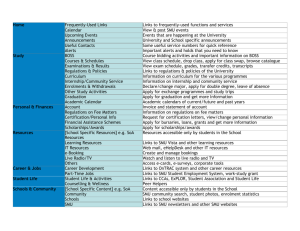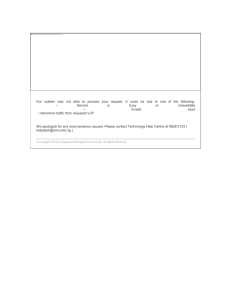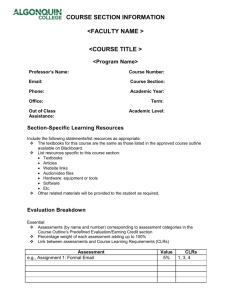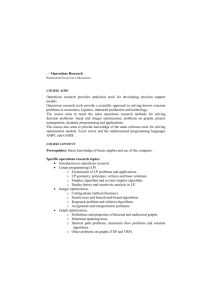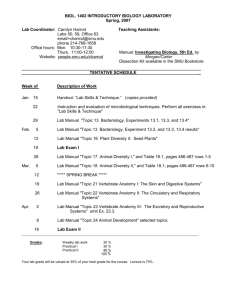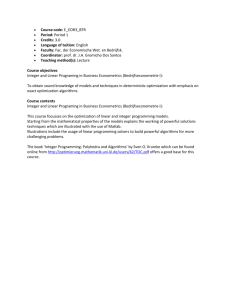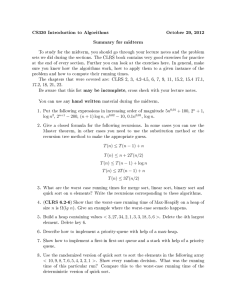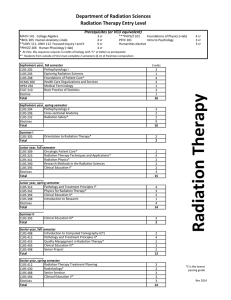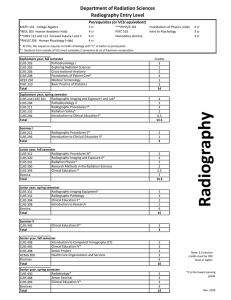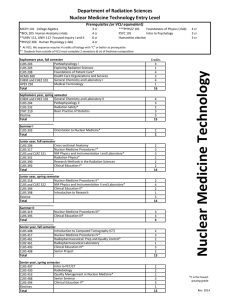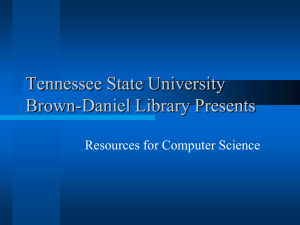Course outline - Mysmu .edu mysmu.edu
advertisement
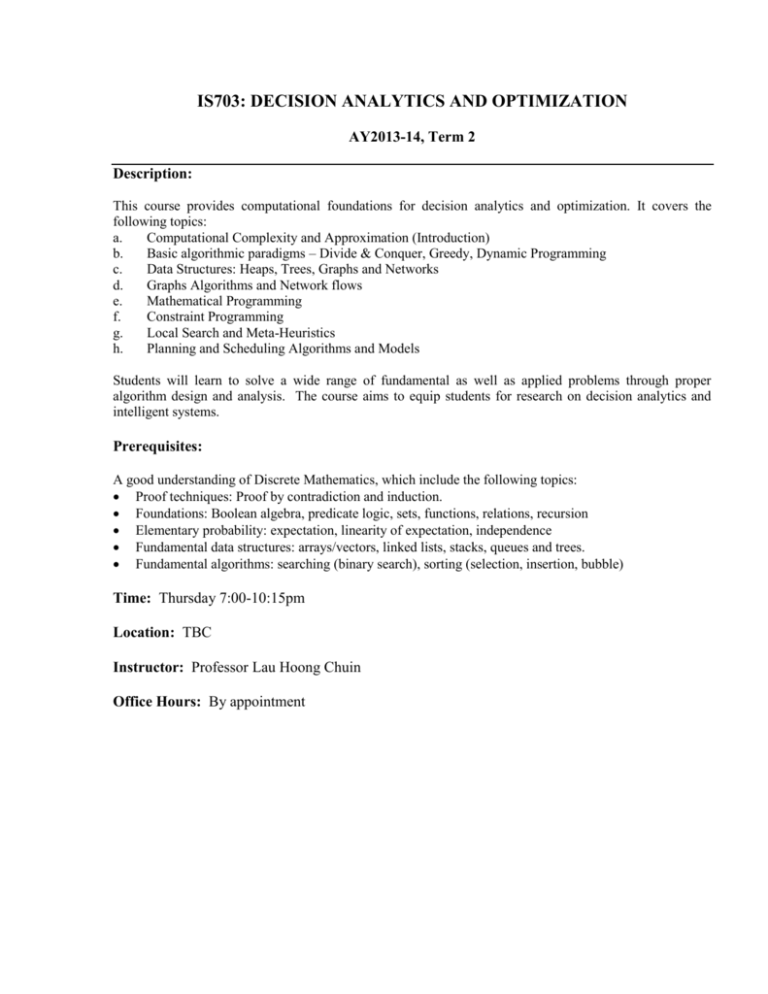
IS703: DECISION ANALYTICS AND OPTIMIZATION AY2013-14, Term 2 Description: This course provides computational foundations for decision analytics and optimization. It covers the following topics: a. Computational Complexity and Approximation (Introduction) b. Basic algorithmic paradigms – Divide & Conquer, Greedy, Dynamic Programming c. Data Structures: Heaps, Trees, Graphs and Networks d. Graphs Algorithms and Network flows e. Mathematical Programming f. Constraint Programming g. Local Search and Meta-Heuristics h. Planning and Scheduling Algorithms and Models Students will learn to solve a wide range of fundamental as well as applied problems through proper algorithm design and analysis. The course aims to equip students for research on decision analytics and intelligent systems. Prerequisites: A good understanding of Discrete Mathematics, which include the following topics: Proof techniques: Proof by contradiction and induction. Foundations: Boolean algebra, predicate logic, sets, functions, relations, recursion Elementary probability: expectation, linearity of expectation, independence Fundamental data structures: arrays/vectors, linked lists, stacks, queues and trees. Fundamental algorithms: searching (binary search), sorting (selection, insertion, bubble) Time: Thursday 7:00-10:15pm Location: TBC Instructor: Professor Lau Hoong Chuin Office Hours: By appointment References: [CLRS] Cormen, Leiserson, Rivest and Stein. Introduction to Algorithms (3rd ed), MIT Press, 2009. - Available for purchase in Booklink - SMU Library Course Reserve call no. QA76.6 .C662 2009 - Bug report: http://www.cs.dartmouth.edu/~thc/clrs-bugs/bugs-3e.php - MIT Open Courseware Fall 2005: http://ocw.mit.edu/courses/electrical-engineering-and-computerscience/6-046j-introduction-to-algorithms-sma-5503-fall-2005/download-course-materials/ [BK] E. Burke and G. Kendall (eds) Search Methodologies: Introductory Tutorials in Optimization and Decision Support Techniques, Springer, 2nd edition, 2014. - Some helpful surveys on Math programming, Constraint programming and Metaheuristics - Available for download through SMU Springerlink [P] M. Pinedo, Planning and Scheduling in Manufacturing and Services (2e), Springer 2009. - Planning and Scheduling Problems and Algorithms - Available for download through SMU Springerlink Weekly lesson materials can be downloaded from the SMU eLearn website. Additional handouts as well as for links to additional references may be provided in class. Supplementary Materials: Skiena, The Algorithm Design Manual (2nd ed.), Springer, 2008. - Available for download through SMU Springerlink - SMU Library Course Reserve QA76.9.A43 S55 Levitin, Introduction to design & analysis of algorithms (2nd ed), Addison-Wesley, 2007. - SMU Library Course Reserve QA76.9.A43 L48 Goodrich and Tamassia, Data Structures and Algorithms in Java (4th ed.), Wiley, 2006. - SMU Library Course Reserve QA76.76.J38 G66 2006 Class Schedule: Wk 1 2 3 4 5 6 7 8 9 Date 9/1 16/1 23/1 25/1 7/2 14/2 21/2 28/2 Topic Introduction, Asymptotics, Recurrences Trees, Graphs and Heaps Divide and Conquer and Dynamic Programming Greedy Algorithms Graphs and Networks Computational Complexity and Approximation First Test (2 hours) Introduction to Mathematical Programming RECESS WEEK Mathematical Programming Reference CLRS 1-4 CLRS 6, Appendix B.4,5 CLRS 7,9,15 CLRS 16 CLRS 22-26 Network Flows application by James Orlin CLRS 34-35 [BK] 2-3 Post: Reading Assignment Selected chapters from [P], [BK] and journal papers [BK] 2-3 Integer and Combinatorial Optimization by Karla 10 11 12 Constraint Programming Hoffman and Ted Ralphs [BK] 14 Planning and Scheduling Algorithms Local Search and Meta-Heuristics CP Tutorial by Roman Bartak [P] 3, 9, 12, 13 [BK] 4, 5, 9-13 TSP: A Case Study on Local Optimization" by Johnson and McGeoch Metaheuristics in Combinatorial Optimization: Overview & Conceptual Comparison" by Blum and Roli 13 15 Group Presentations of Reading Assignments Second Test (3 hours) Grading: Class Participation Group Presentations First Test Second Test Total : : : : : 10 20 30 40 100 % % % % % Academic Integrity All acts of academic dishonesty (including, but not limited to, plagiarism, cheating, fabrication, facilitation of acts of academic dishonesty by others, unauthorized possession of exam questions, or tampering with the academic work of other students) are serious offences. All work (whether oral or written) submitted for purposes of assessment must be the student’s own work. Penalties for violation of the policy range from zero marks for the component assessment to expulsion, depending on the nature of the offense. When in doubt, students should consult the instructors of the course. Details on the SMU Code of Academic Integrity may be accessed at http://www.smuscd.org/resources.html. Empirical Research Project for IS703 This is an individual project. Each student should complete a research OR survey paper on a topic in Optimization, Decision Analytics, Metaheuristics. Instructions for research paper: Identify a research problem. The problem must make sense. Design a solution to the problem, and show (either analytically or through a simulation study or throw-away prototype) that the proposed solution is superior to existing techniques. The paper should be no more than 8 double-column pages, in the ACM conference format at: http://www.acm.org/sigs/pubs/proceed/template.html. The report will be graded on (a) originality and feasibility of the solution, (b) effectiveness of the solution, and (c) presentation (clarity, organization, English). Instructions for survey paper: Read at least 4 published papers on the selected topic. Write a survey paper that covers the following: o Introduction: motivation, application domain, problem definition o Summaries of the techniques developed in each paper, clearly highlighting the strengths and weaknesses of each o A taxonomy of the various techniques if possible o Future research directions The paper should be no more than 8 double-column pages, in the ACM conference format at: http://www.acm.org/sigs/pubs/proceed/template.html. The report will be graded on (a) understanding of the chosen papers, (b) critique of the papers, and (c) presentation (clarity, organization, English). Project Topic: The project topic must be approved by the Course Instructor. Otherwise, the report may be penalized for being out-of-scope. Topics that also intersect with the student’s research area are encouraged (but not required). Project Schedule: Week 7: Project proposal Week 14: Report due
